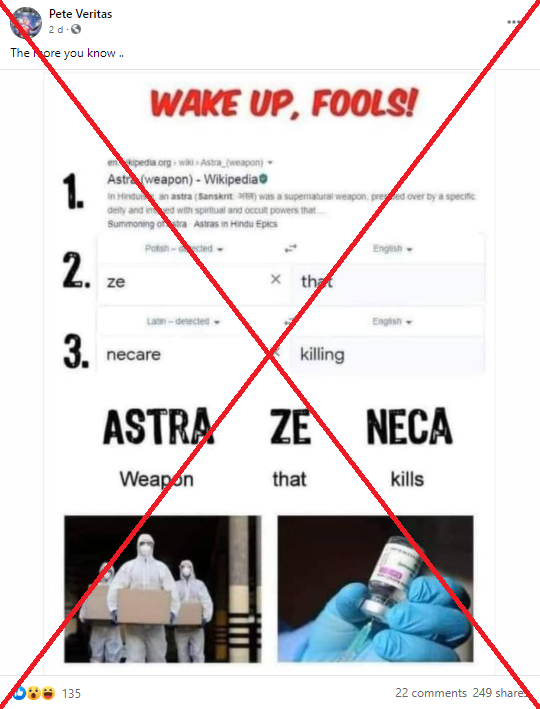
Facebook posts mislead on meaning of 'AstraZeneca'
- This article is more than four years old.
- Published on March 29, 2021 at 06:15
- 2 min read
- By AFP Australia
The Facebook post was published here on March 23, 2021. It has been shared more than 250 times.
The image features a screenshot from a Wikipedia page entitled “Astra (weapon)”. It also shows a screenshot of a Google Translate window, suggesting that “Astra Ze Neca” means “weapon that kills” in a combination of Sanskrit, Polish and Latin.
“Wake up, fools!” reads the red text on the image.

A screenshot of the misleading Facebook post.
The Facebook post's caption reads: "The more you know..."
The post circulated online after leading EU countries, including France, said they would resume Oxford/AstraZeneca vaccinations after a brief suspension to assess the vaccine's safety.
On March 18, 2021, the European Medicines Agency (EMA) said the jab is "safe and effective" and not associated with a higher blood clot risk after days of commotion around the shot. The WHO and Britain's health watchdog have also said the vaccine is safe. AFP reported on the developments here.
The image was also shared in Facebook posts here, here, and here alongside a similar claim.
The claim is misleading.
Greek origins
Before the coronavirus pandemic, AstraZeneca explained the origins of its name in a series of tweets on October 17, 2019.
"Astra" derives from the Greek word “astron”, meaning “star”. "Zeneca" is the name of a former British pharmaceutical company and does not have another meaning in any language, according to AstraZeneca's tweet.
"Zeneca" is an invented name, created by an agency instructed to find a name which began with a letter from either the top or bottom of the alphabet and was phonetically memorable, of no more than three syllables and did not have an offensive meaning in any language.
— AstraZeneca (@AstraZeneca) October 17, 2019
In 1999, Astra AB and Zeneca Group merged to form AstraZeneca in one of the largest ever European mergers, as noted in reports at the time by BBC and CNN.
The former chief executive of Zeneca, David Barnes, told British newspaper The Daily Telegraph in January 2001 that he instructed branding agency Interbrand to find a name.
"There is an advantage in being alphabetically at the top or bottom of lists, A or Z," Barnes told The Daily Telegraph. "I asked Interbrand to find a name that was phonetically memorable, of no more than three syllables and didn't mean anything stupid, funny or rude in other languages. A new name also allowed us to instill a new company culture".
Copyright © AFP 2017-2026. Any commercial use of this content requires a subscription. Click here to find out more.
Is there content that you would like AFP to fact-check? Get in touch.
Contact us




